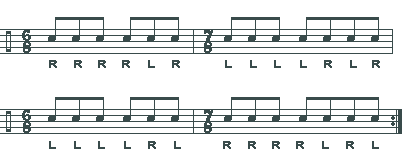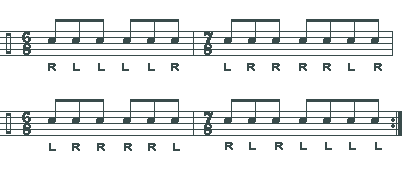
In order to continue improving our coordination and stick control, we're going to move on to Four Stroke Exercises. These are just what the name implies: four bounces on a single stick before striking with the next stick.
![]()
![]()
Nothing too elaborate: working four strokes into normal sticking patterns. You'll notice these are far more challenging than mere triples!
![]()
![]()
Fours #1
We'll begin as we did with the triples: four strokes with each hand. Start slow, then speed up, drumming as fast as you can for a full minute, then slowing down. Repeat three times. Try to make it sound like a four-stroke buzz roll!
Once you're comfortable starting off with the right hand, switch to the left as the lead hand in the pattern (I didn't notate this, but you should have no problem figuring it out by now).

Fours #2
Just like the triples, we're adding a single stroke into the pattern: this time after the four. You can also add the extra note before the four, or somewhere in the middle. Begin to develop the ability to shift the pattern around in the measure to improve your stick control. Future exercises will assume you have developed this skill and are building on the basic patterns I'm giving you here.
There are two exercises on this bar: do each of them separately, working as above: slow-fast-slow, with three reps.

Fours #3
Now we'll add two single strokes before the four. This is building your stick control.

Fours #4
This is the same pattern as above, but I've shifted the focus to start with the four, not the singles. It feels very different doesn't it? Try to keep the count and not let yourself slip into the count of #3.

As we did with #3, can you figure out how this one can be shifted so that you're changing the phrasing? How many variations can you pick up?
Fours #5
Now we're adding three singles to the four-stroke pattern. How many variations can you find in this exercise if you shift the note one note to the right?

Fours #6
Here we finally add four singles (you knew I was going to do this, didn't you?). I'll give you two variations on the pattern to get you started.


Fours #7
OK. Now we're going to have some fun. Let's mix up the singles, doubles, and fours. Since the first exercise we've separated each four with a different pattern. Let's begin to put them back-to-back again and see how it feels.

Fours #8
Here we simply vary between a single and a double between the fours. Pretty simple, really.

Fours #9
This one if just a hodgepodge that feels rather weird to play.

Fours #10
One thing you may have noticed is that these exercises make great warmups. One way of using them would be to start with Exercise #1, then add one single, then add two, then three, then four, but doing each exercise separately.
The following pattern joins them all together, and would be a good capper to the warmup: try to do this really fast!

![]()
![]()
Is it possible to do Five Strokes, or Six Strokes, or more? Yes. But we won't cover them here as exercises; you're encouraged to develop them on your own. We may drop them into future exercises, however, so you'd probably best get to work on them!
If you've noticed, we have alternated our Double, Triple, and Four Stroke Exercises with single strokes. This will be the last time I'll be so easy on you; future exercises will mix and match these patterns. Things will start to get interesting once we've built our foundation.
As always, let me know how you've done!
![]()
![]()
![]()
